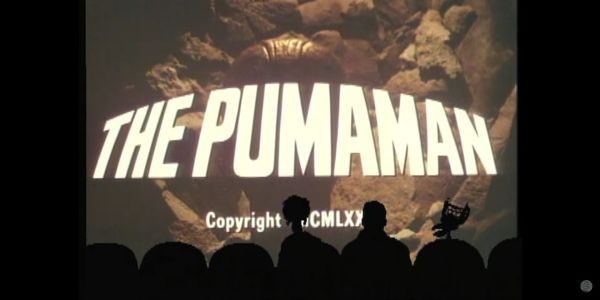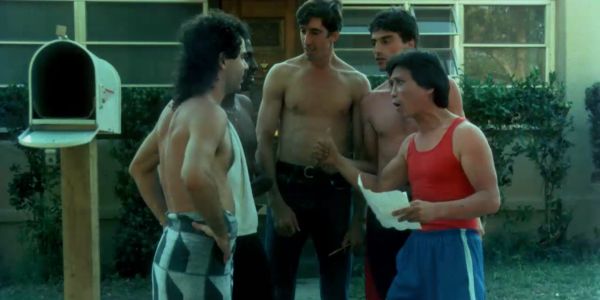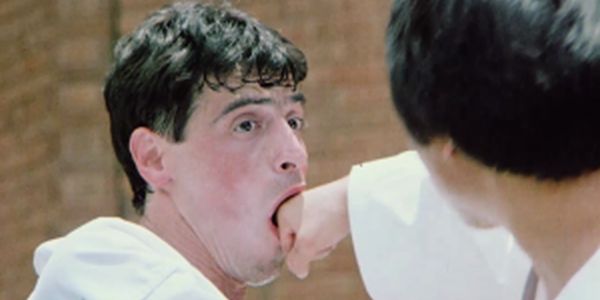Trying to Keep Our Sanity: In Unironic Praise Of Bad Movies

Joe George teaches English at the University of North Carolina…
On April 14th, Netflix will begin showing new episodes of Mystery Science Theater 3000, the cult series devoted to watching, and making jokes about, bad movies. During the show’s 20-year absence, bad movie fandom has ballooned to the extent that incompetent movies have now arguably supplanted intentionally weird films as the dominant cult subgenre.
Part of this boom can be attributed to the increased visibility of bad cinema. These past two decades have seen the release and discovery of some truly awful movies, films that rival Plan 9 From Outer Space and Manos: The Hands of Fate for their utter absurdity. The bad movie canon now includes the troll-less creature feature Troll 2, David Prior’s testosterone-fueled Deadly Prey, the Hitchc*ck riff in James Nguyen’s Birdemic, the utterly inexplicable Neil Breen films Fateful Findings and Double Down, and of course, Tommy Wiseau’s feature-length pity party The Room, easily the most popular of the bunch.
But Mystery Science Theater 3000 (MST3K, as it’s known to fans), which has only increased in popularity since its cancellation, also deserves much of the credit, simply for showing us that we can enjoy movies that seem unenjoyable. However, as instrumental as it has been in fostering a love of bad movies in people like me, the show’s premise also advances a stereotype that still plagues the genre: we watch bad movies to make fun of bad movies.
Repeat To Yourself, “It’s Just a Show.”
Flip on a random episode and MST3K, and you’ll likely see what has become the show’s iconic image: in front of a cheap-looking movie, the silhouette of a man (first played by Joel Hodgson, then Michael J. Nelson, and in the new version by Jonah Ray) sitting in theater seats and flanked by two robot puppets. You’ll likely hear what has become the show’s greatest appeal: the human and the ‘bots “riffing” on the movie. For example, with every shot of Reb Brown, the well-muscled but charisma-free star of the sci-fi clunker Space Mutiny, the human and the puppets shout out a ridiculous name, such as “Big McLargehuge” or “Roll Fizzlebeef.” When a jaunty 70s theme plays in the 70s superhero flick The Pumaman, one of the robots sings, “Pumaman, he flies like a moron!”

According to one version of the show’s exposition-heavy theme song, Joel (or Mike or Jonah) needs to make these jokes because he is trying “to keep his sanity with the help of his robot friends.” After all, the song also tells us, our hero has been captured by mad scientists and forced to watch these films as part of a cruel experiment. He must resist, and he resists through mockery.
Too many observers of bad movie fandom take literally the show’s frame narrative, assuming that we are all like Joel, Mike, and Jonah and we must mock these movies because that’s the only way to survive watching such garbage. They assume that people watch these films ironically, laughing at or insulting them for their failure to be “real” movies.
To those with this assumption, I’d like to quote the theme song’s most well-known line: “Just repeat to yourself, ‘It’s just a show. I should really just relax.’” While this “us vs. them” idea makes a good hook for the series, it doesn’t apply to people like me, who willingly purchases a Bluray copy of Sleepaway Camp or has a VHS collection of Cannon Group action films. I’m not being forced to watch these movies, nor do I watch to ridicule their failures. Instead of watching them for what they aren’t, I watch them for what they are: oddities whose difference from other, more competent films creates genuine delight.
A Sweet Cynicism
Like their fellow forms of “paracinema” (the general term, coined by Jeffery Sconce, for non-mainstream movies, including everything from “badfilm” to “splatterpunk and ‘mondo’ films” to “just about every other historical manifestation of exploitation cinema”), bad movies offer an utterly unique take on the world, with stories unlike any other.
Granted, where more adept filmmakers like Frank Henenlotter and John Waters intentionally craft offensive or kitschy cinemascapes, bad movie makers often achieve this effect through incompetence or an unconventional muse. But the movies are still unique, whatever their creators’ intentions. One need not know the history of melodrama or the significance of Rebel Without A Cause to be amused at how The Room presents its own overwrought and not at all human version of James Dean’s famous lament.
And, yet, that’s where the appeal lies. Yes, one cannot help but laugh at the bad line reading of a Troll 2 victim or the ludicrous level of expertise director and star Neil Breen endows on the heroes he plays, but it isn’t an angry laughter that condescends to the movie for making mistakes. It’s not that Troll 2 or Fateful Findings should be a “better” horror or thriller; it’s that they reshape otherwise familiar stories into something heretofore unseen, and we laugh in delight.
In her well-known essay “Notes on Camp,” critic Susan Sontag offers a description that perfectly captures bad movies enjoyment. “Camp taste is, above all, a mode of enjoyment, of appreciation – not judgment,” she writes; “It only seems like malice, cynicism. (Or, if it is cynicism, it’s not a ruthless but a sweet cynicism).”
What we appreciate, then, is not is not that this movie fails to be something good, but that it succeeds in being something weird and surprising. As Sontag explains, “Camp taste is a kind of love, love for human nature,” and there is absolutely something deeply human in the oddities these films create.
Friends Through Eternity
One of the best examples of this love of human nature within bad movies occurs in a scene that sets off the final act of the 1987 action film, Miami Connection. The movie’s heroes, a group of taekwondo masters who also play in a rock band and also live together and also are orphans, discover that one of their members has a still-living father and the government has just revealed his location. The recently unorphaned Jim (Maurice Smith) exclaims “I found my father! Oh my God!”, and his friends rush out of their shared home, mostly shirtless and their pants unbuttoned, to gather around him in celebration.

We see the men jumping and cheering together, but the audience can hardly figure out what’s happening because the dialogue (heavily-accented in the case of Korean-born star and producer Y.K. Kim, poorly improvised in the case of the native English speakers) overlaps to the point of incomprehension. We viewers don’t know what we’re seeing: it’s excessive and amateurish to the point that we don’t even recognize that this is an action film, but the oddness of the plot and jubilance of the people on screen gives us pleasure nonetheless.
The optimistic and inclusive tone found in that scene courses through Miami Connection’s many digressions, especially in what might be its most unique addition to the action genre: its rock band protagonists. When we initially meet the heroes’ band Dragon Sound, the emcee introducing them promises a “new dimension in rock and roll.” The band’s synth-driven rock, clearly a product of its time, never quite achieves that goal, but their songs are competent and pretty catchy. Standout tracks “Friends” and “Against the Ninja” feature great hooks and solid performances, despite their simplistic lyrics (“Friends through eternity / loyalty, honesty / We’ll stay together through thick or thin”).
The concert scenes could come off as indulgent digressions, like when Steven Seagal hops on stage to play a tune with Marty Stuart in Fire Down Below, but they really aren’t. Unlike Fire Down Below (a bad movie that offers incompetence, but no unique worldview ), Miami Connection isn’t an action movie interrupted by a musical interlude; rather, it’s a movie devoted to showing how taekwondo makes people fun and helps them bond. That conviction explains the scene when, in the middle of a performance, the members of Dragon Sound stop pretending to play their instruments and put on a martial arts exhibition, climaxing with Kim’s character Mark uses his foot to grab Jim’s nose and guide him in a circle. It’s an action that can only described as buddies goofing around and is, therefore, enjoyable.
That devotion to portraying “friends for eternity” informs even the movie’s numerous fight scenes. Kim cast the film primarily with students from his Orlando martial arts academy, which means that they have the same martial arts mastery as their characters and need no stunt people. As a result, the movie offers remarkably coherent shots of people fighting one another.
But it also offers remarkably dull shots of people fighting one another. One can clearly see attackers standing around, waiting for their turn to walk into the heroes’ feet and fists. The main characters, particularly Mark and John (Vincent Hirsch), do pull off impressive jump kicks and flips, but they do so as if they were putting on an exhibition, not barely surviving a street fight.
Of course, they are just putting on an exhibition. The poor direction breaks the movie’s artifice, but replaces it with an increased appreciation for how much the actors enjoy doing martial arts and enjoy one another, which we enjoy in turn.
Consider a training montage in which Kim and his students practice on the lawn at Central Florida University. Gone is even the pretense of the movie’s narrative, leaving us with just footage of the heroes showing off their taekwondo moves, kicking and punching at each other, lunging at one another with wooden knives. Never content to just be a highlight reel, Kim takes Miami Connection to a new level of weirdness by including a bit in which his character Mark puts his fist in the mouth of Jack (Joseph Diamond) and forces his to the ground. The camera holds on Jack’s inexplicably slack expression, made all the more absurd by the hand stuck to his jaw, giving us something oddly singular.

Once again, the moment works in part because we see the weird way these friends interact, and it’s that sense of camaraderie that drives most of the movie’s unusual scenes. The actors’ sincere positivity makes enjoyable an otherwise choppy conversation about Dragon Sound performing in Israel, Italy, and other “places where [their] parents are from.” It sells the scene in which Mark hand-feeds grapes to each of his bandmates.
Even the most aggressive moments, like a clearly improvised and profanity-laden argument between a club owner and a rival band, never betray a mean spirit, keeping intact a “let’s put on a show” pluck that redeems the movie’s unconvincing plot and effects. You may not believe that the young man with baby powder in his hair is Jim’s long-lost father or that the clump of plastic spouting red water is a recently decapitated body, but you do believe that this is a lot of fun.
Thus, there’s no real sense of irony when the movie closes with a title card declaring: “Only through the elimination of violence can we achieve world peace.” If audiences believed the bloody action that preceded the title card, which culminates with the heretofore peace-loving Mark and John bellowing like rage-filled beasts after being forced to slaughter the ninjas who almost killed their friends, then the declaration would be disastrously incongruous. But because we accept the movie’s positive outlook, and understand its violence as just friends goofing off, then the card makes sense. Miami Connection is a peace-loving, feel-good movie, even when it pretends to be a gritty drama.
To be sure, the appealing aspects of Miami Connection come along with unquestionably poor filmmaking, including incomprehensible line readings and a needlessly complicated plot. And while most of the “hanging out with the boys” sequences offer harmless fun, one cannot defend the beach scene in which the Dragon Sound guys harass and even fondle random women. But these elements all fade in light of the overall positivity and welcoming fun of Miami Connection, one that invites viewers to laugh along with it.
Laughing With, Laughing Together
As suggested by this emphasis on welcome, Miami Connection and other bad movies lend themselves to communal enjoyment. Not only do theaters and clubs continue to host bad movie nights across the country, but fans have developed a series of rituals to perform when they watch them together. Where those attending showings of The Rocky Horror Picture Show or Monty Python and the Holy Grail would bond over their costumes and line recitations, people come to The Room prepared to throw spoons at the screen every time a framed picture of the utensil gets caught in the shot. Together, filmgoers reinterpret Wiseau’s insular and misogynistic vision into something to be shared, to be enjoyed for being a very different type of movie.
This communal enjoyment of bad movies is the real legacy of Mystery Science Theater 3000. In the same way that Miami Connection is two hours of friends doing martial arts while barely pretending to fight ninjas, MST3K is a 90 minutes of people celebrating bad film while barely pretending to loathe it. For superfans like me, each episode brought new cinematic strangeness and modeled ways of enjoying it. And, apropos of a show about laughing together, MST3K fostered a community of bad movie lovers by giving us a series of “in jokes” to share: ready to repeat riffs about Zap Rowsdower pondering beer on the sun, a sarcastic “okay” sign followed by a sneering “it stinks!,” and songs about the child-friendly giant turtle Gamera.
The show has stayed alive because of its community – first in the form of a letter writing campaign that saved the show from an earlier cancelation, then in the form of episodes circulated on VHS tapes and other media, and now in the form of a highly-successful Kickstarter campaign. MST3K taught us how to find pleasure in the absurd, even when that absurdity occurs despite the filmmaker’s intentions. But more, importantly, it taught us that we best keep our sanity when we watch with our friends, robot or otherwise.
What’s your favorite bad movie? What do you enjoy about watching it?
Does content like this matter to you?
Become a Member and support film journalism. Unlock access to all of Film Inquiry`s great articles. Join a community of like-minded readers who are passionate about cinema - get access to our private members Network, give back to independent filmmakers, and more.
Joe George teaches English at the University of North Carolina at Greensboro. When not teaching about books, movies, and comics, he's writing about books, movies, and comics. He can be found at joewriteswords.com or @jageorgeii on Twitter, but he can never be found outdoors.













